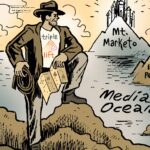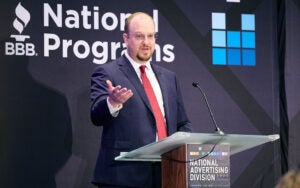The podcast industry is ripe for influencer marketing.
That’s the view of Agnes Kozera and David Kierzkowski, co-founders of self-serve influencer marketing platform FameBit, which Google acquired in 2016. The pair has since left Google and is developing an analogous platform for the podcast industry, which has plenty in common with the video influencer market, Kozera said.
Because the podcast market is so fragmented, it’s too difficult for brands to discover smaller talent and shows that may strike a chord with their audiences.
“Smaller podcasters haven’t had a way to collaborate with brands directly,” Kozera said.
Podcorn wants to facilitate those introductions. The platform, in beta and set to launch at the end of October, uses an algorithm to match brands with podcasters based on their audiences and business goals. The algorithm uses machine learning to understand what works or doesn’t work for a given brand or podcaster over time to improve its matches.
Currently there are 1,000 podcasters and 100 advertisers signed up for the platform’s waitlist. Podcorn raised a $2.2 million in August in a seed round led by Global Founders Capital.
“The more brands and podcasters use our platform, the smarter it gets for them,” Kozera said.
While shows with millions of listeners can command high CPMs for host-read or dynamically inserted ads, smaller podcasters are making pennies per listener hour, according to Edison, IAB and Nielsen data. So Podcorn encourages brands and podcasters on its platform to use native ad formats, such as brand interviews, paid movie reviews or roundtable discussions that convert better for lesser-known shows, rather than generic pre-roll, mid-roll and post-roll ads.
Podcorn facilitates negotiations between podcasters and brands, most of which start on an industry-standard CPM basis. But Podcorn wants to help smaller podcasters command better prices based on attributes such as length of an integration, the audience niche reached by the podcast or the host’s expertise on a specific topic.
“If they do get to price themselves and integrate brands more organically, they actually can earn a lot more for that,” Kozera said.
While Podcorn leaves the creative process up to the podcaster and the brand, it supplies best practices for FTC disclosures, pricing and native advertising formats. Podcorn also helps users make their pitch more competitive by analyzing who a given brand or podcaster has worked with in the past.
Ultimately, the podcaster is in control of the creative and determines if a product works for them or will jive with their audience.
“It’s never going to be in a brand’s voice or their own ad being put on a podcaster’s channel,” Kozera said.
Rather than just focusing on the number of downloads or impressions, Podcorn will collect qualitative information from brands about their experiences working with podcasters. That will require brands to self-report about their failures and successes on the platform regularly.
“A lot of it is heavily based on brands reporting back to us,” Kozera said. “Brands are incentivized to give you more information when it helps them make better hires.”
For now, Podcorn will focus on working with small and midsize podcasters and brands who haven’t previously monetized. But eventually it sees opportunity to bring on podcasters and brands of all sizes looking for the right match.
Agencies might argue that indie podcasters don’t have the professionalism or production chops necessary to create a good advertisement for a brand. But Kozera points to the video space, where influencer marketing is poised to become a $15 billion business by 2020 and many brands are repurposing influencer content as their own preferred creative work.
“Creators are the best suited to dictate ideas,” she said. “They are brands in and of themselves. They understand what it takes to build a content empire and engage audiences. When you put a middleman in front of it, you can mess it up and miss the mark.”
But the podcast industry faces some challenges the video world doesn’t. Distribution and listening are much more fragmented, making discovery a challenge, and analytics for advertisers are limited at best, slowing the tide of brand dollars into the space.
But those complexities just provide a bigger opportunity for Podcorn to facilitate connections and bring more dollars into the space, Kozera said.
“Influencer marketing was under $1 billion when we first started [FameBit], and it grew exponentially,” she said. “I think you’re going to see insane growth in this space.”















